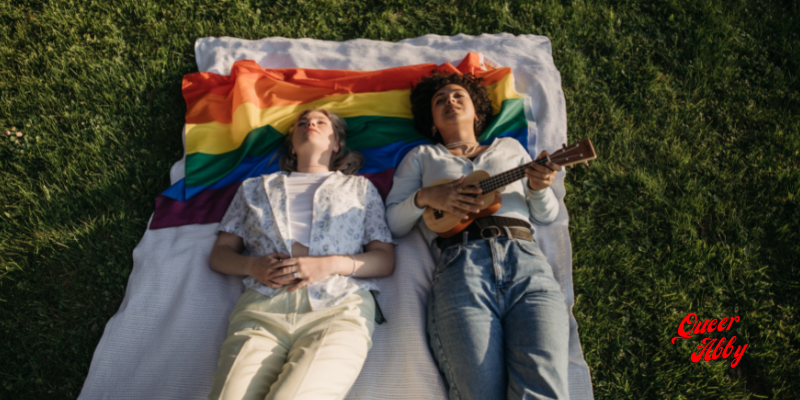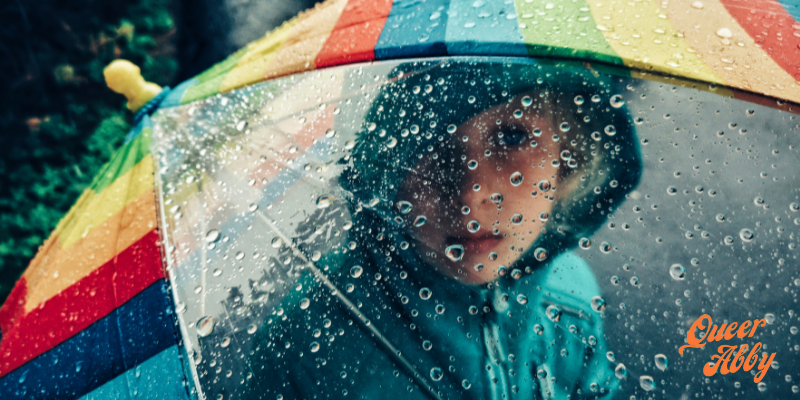
The Last Lesbian to the Party: Part 1
In some ways, all of the signs and signals were there—from my first crush on a girl in third grade, through weight-lifting with members of the women’s rugby team in college, and loving to surround myself with queer community in adulthood. There are so many things from my past that should have signaled, “Hey Jill, you might probably be kind of gay.” But that’s not my story.
I came out as a lesbian at 38 years old. I’m not the only odd duck to do so—there are heaps of us “late bloomers,” “fireflies,” and “Lilles” on social media, however, amongst most of my social groups I am still in the minority. Most people figure out their sexual attraction before they approach 40. Most people would figure out if they were in a relationship mismatch before two decades had passed.
There is no easy explanation as to the why and when of my coming out as queer. However, I have identified six factors that I believe strongly contributed to me figuring myself out late (but not too late). Because this blog turned into a behemoth, I decided to break it up into two shorter stories. You’ll find the first three of my reasons here and the next three in a subsequent blog that I’ll release on March 1, 2023.
My hope is that if I share the reasons behind my own delayed identity acceptance here, then we can more consciously raise the next generations so that they don’t have to go through the same.

Reason #1: Lack of Queer Visibility
Growing up as a kid of the 80s and teen of the 90s, queer representation was pretty limited in my life. I remember hearing whispers of things like the flamboyant costumes of Sir Elton John, the unique voice of Richard Simmons as he encourage women in Sweatin’ to the Oldies, and Pedro Zamora from the cast of Real World San Francisco sharing that he was gay and had AIDS.
My mom had gay coworkers at the restaurant where she worked and we both suspected that my favorite teacher in middle school may also be part of that world. But, aside from Pedro’s public declaration on MTV (which both shocked me and brought me to tears for days), I don’t recall many open conversations about queerness. Any talk I did hear was generally a slur made in passing. And almost all examples of queerness that I was aware of were men.
In a craniosacral therapy session in my adulthood (the first time I tried coming out), the therapist held her hands over my abdomen and asked, “What are you remembering here? It goes back to about third grade.” I instantly knew. I could see the girl’s stunning eyes and tan skin so vividly in my mind. It was a girl from my dance studio and the first person I recall ever having a crush on.
However, up until that moment, I had never put the emotions I was feeling to the fact that it was an attraction. It’s weird to say now, but without seeing it or hearing words around it, it’s like I didn’t even realize that what I was feeling was both normal for some people and an option that I had in life. I just remember really really wishing she would hug me and I wasn’t sure why.

Reason #2: Compulsory Heterosexuality
This seems to be the phrase that EVERY late bloomer knows and approximately 2 straight people have heard of as well. It’s also something we need to continue talking about since the terminology is not new (it dates back to the 1970s) and yet it still contributes to identity confusion in many queer individuals. Long story short, compulsory heterosexuality means that we raise children under the assumption that they are heterosexual.
I wrote a whole blog about it here, but Cliff Notes are that we (particularly in the US) make a lot of assumptions about a child’s sexuality from youth. We tease about preschool “boyfriends” or “girlfriends,” we tell our kids “when you grow up and are a wife and mommy” or “a husband and daddy”, and we remind girls how “boy crazy” they’ll be as teenagers.
Beyond language, this extends to the books we read to them and the media we show them, which in the past were almost exclusively heterosexual couples. I grew up with a very clear expectation of what I was supposed to be. My mom even bet me that if I got married before I turned 30 I would have to take her on a trip to Hawaii. Although I had never had a real boyfriend at that point in my teenage years, it was far before gay marriage was federally legal, my lack of interest in dating or marriage didn’t seem to matter. She (and everyone else) were pretty sure I’d get straight-married someday.*
*I feel the need to clarify that this is not a slam against my parents or how I was raised. In fact, with most of my peers, this is exactly how they were raised too. It was the norm. It’s how so many continue to raise their own kids nowadays. We have to talk about these realities, however hard they may be, so that we can learn what we can make better. I love my mom and know she loves me and raised me in the absolute best way she knew how.

Reason #3: Parental Hopes
Compulsory heterosexually flows directly into the next contributing factor—parental hopes. I knew that not only did my parents assume I was straight, but they also wanted me to be straight. I recall a conversation in my teens with one of my parents expressing that they wouldn’t want a gay child. The reasoning wasn’t rooted in hate toward the queer community, it was just the fact that they knew then (as parents still know today) that life is harder for queer kids and adults. (If you don’t want to believe that, then I would suggest checking out this report.
I wanted to make my parents proud of me. I wanted them to love me and be happy with the life I was creating for myself. While I didn’t feel insecure in my parents' love, I did put pressure on myself to live out the dreams they had for me—like graduating college, having a respectable career, getting married, and having kids. I was not only committed to trying to achieve these ideals but I was also obsessed with achieving them.
An Intermission to Grab a Snack!
Let's pause here and allow those bites to digest before diving into Part 2 of this blog, Reasons 4 through 6 which kept me in a state of confusion about my own identity. In the meantime, realize that my experience is just that—MY experience. Results may vary. Religion will almost certainly play a role in others’ self-denial in a way that it did not in mine. But masking who we are is not healthy, nor does it serve us in the long term. Let’s continue these conversations so that fewer people have to mask their identities in the future.